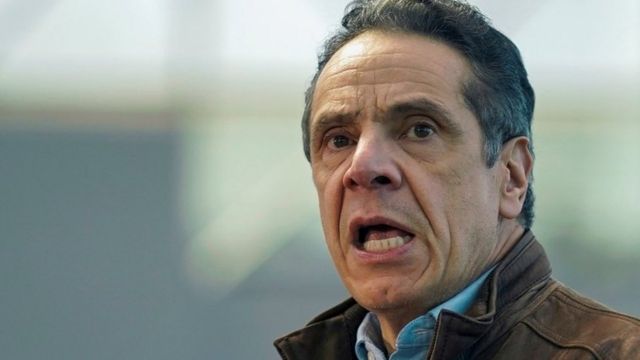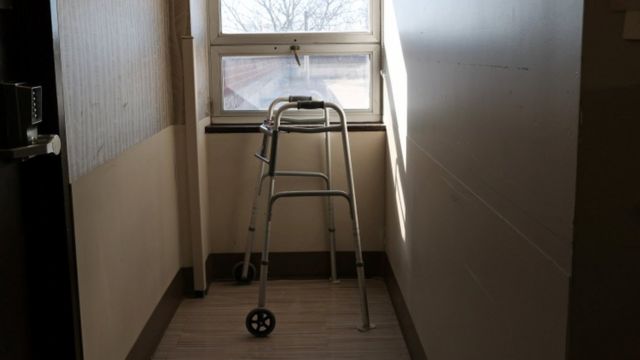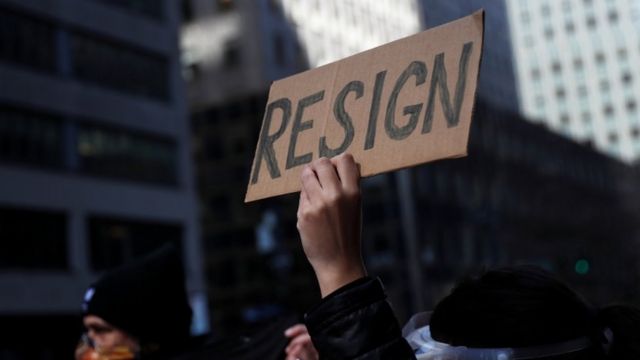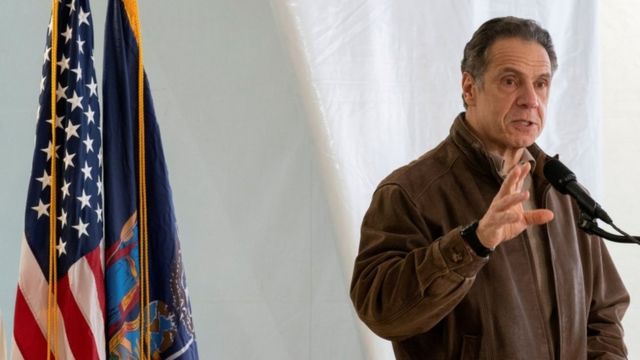How the NY Governor went from 'hero' to 'villain' in the pandemic amid scandals and accusations of harassment
Democrat Andrew Cuomo is accused of sexual harassment and cover-up of data on the pandemic
In March of last year, when New York State was the main epicenter of the coronavirus pandemic in the United States, Governor Andrew Cuomo became something of a national hero.
While then President Donald Trump minimized the risks of the covid-19 , Cuomo, a Democrat in his third term, presented an opposite image, of leadership, transparency and empathy.
Their daily briefings , with detailed explanations of the response to the crisis, were broadcast live on TV and accompanied by millions of people and even won an Emmy Award.
For months, the governor's performance was extolled by the press, which toyed with Cuomo's popularity in articles with headlines like "Why do we all have a crush on Andrew Cuomo right now" or "help, I think I'm in love with Andrew Cuomo" .
Amid the primaries that would decide who the Democrat would run for president, many questioned whether Cuomo would be a better candidate than Joe Biden to face Trump at the polls.
"In the midst of the coronavirus crisis, he became a national figure. His popularity and approval soared. He became anti-Trump," political scientist Harvey Schantz, a professor at New York State University (SUNY), tells BBC News Brazil. ) in Plattsburgh.
But in recent weeks, his image has suffered a blow, with accusations that he hid the real number of deaths by covid-19 in nursing homes and allegations of sexual harassment.
Cuomo now awaits the result of investigations into his conduct and faces pressure even from politicians in his own party to leave power.
On Friday (12/03), leading Democratic politicians, such as Senators Chuck Schumer and Kirsten Gillibrand and Congresswoman Alexandria Ocasio-Cortez, called for Cuomo's immediate resignation.
Report pointed out that the state government had reported a number of deaths by covid-19 in nursing homes about 40% less than the real
Deaths of the elderly
The turnaround in Cuomo's image began in late January, when New York's attorney general, also Democrat Letitia James (who was elected to the post, and is not nominated by the governor), released a report with the conclusion that the state government had reported a number of deaths by covid-19 in nursing homes about 40% less than the real one.
The figures released initially included only the elderly who died in these institutions and not those who died after being transferred to hospitals.
The difference did not change the total number of deaths in the State, since the deaths had been computed, but did not include the information that they were residents of nursing homes.
The episode affected the image of transparency cultivated by the governor. Cuomo had already been criticized for an order issued in March 2020, for nursing homes to readmit patients who had tested positive and were still recovering from the coronavirus after being discharged from the hospital.
According to critics, the measure contributed to increase the contagion and deaths by covid-19 in these institutions. Cuomo said he was following guidelines from the federal government and sought to prevent hospitals from becoming overloaded.
He rejected the criticisms as partisan attacks, but ended up reversing the measure in May.
A report by the State Department of Health said that most patients sent from hospitals back to nursing homes were no longer contagious when admitted. According to the government, the virus had been spread by employees of these institutions who did not know they were infected.
But Cuomo's problems were compounded by reports that advisers had admitted that the actual number of deaths in nursing homes was hidden to prevent attacks by political opponents, such as Trump.
In the face of criticism and pressure, he admitted that it was a mistake not to provide public information on the measures taken by the government more quickly.
"This was really a blow to the image of the governor," says Schantz.
Government decisions regarding the coronavirus in nursing homes ended up being the subject of federal investigation.
In addition, several senior public health officials in the state recently resigned amid tensions with Cuomo and disagreements over the response to the pandemic and the vaccination plan in New York.
New York protest calls for resignation of Governor Andrew Cuomo
Sexual harassment
Cuomo was already facing this crisis related to the pandemic when accusations of inappropriate behavior with women began to arise.
At the time of writing, six women had reported episodes - ranging from inopportune comments and unwanted advances to allegations of sexual harassment.
The first to go public was Lindsey Boylan, a former state government official who, in December last year, wrote on Twitter that Cuomo kissed her on the lips without her consent and, on one occasion, invited her to play strip poker .
"@NYGovCuomo has sexually harassed me for years," tweeted Boylan. "Many saw it, and just watched it. I could never anticipate what to expect: would I be charged for my work (which was very good) or harassed for my appearance. Or would it be both in the same conversation? It was like that for years."
In late February, Boylan, who is now running for public office in Manhattan, repeated details about the episode, which would have occurred in 2018. The governor's office denied the allegations.
But a few days later, another former aide, Charlotte Bennett, 25, told The New York Times and CBS News that last year, the 63-year-old governor asked several questions about his sex life, whether she had already had sex with older men and age was thought to make a difference in a relationship.
According to Bennett, Cuomo said he was lonely and that he didn't mind getting involved with a woman in her 20s. She says the questions led her to conclude that he "was trying to sleep with me" and that he reported everything to the chief of staff. She was transferred to another sector and then resigned.
Two days after Bennett's allegations went public, Anna Ruch, who was invited to a 2019 wedding at which Cuomo was present, said the governor, whom she had just met, touched her bare back, put her hands on her cheeks and asked if he could kiss her.
Last weekend, Ana Liss, 35, who worked as an advisor to the governor between 2013 and 2015, told The Wall Street Journal that Cuomo asked if she had a boyfriend, called her a sweetheart, touched her back in a reception and sometimes kissed his hand.
'Toxic' environment
Also last weekend, a fifth woman, Karen Hinton, who was a consultant to Cuomo when he was National Secretary of Housing, told The Washington Post that in 2000 he called her into her hotel room and hugged her without her. consent.
Hinton said he disengaged himself from Cuomo but that he pulled her back, and she then left the room.
A government spokesman denied the truth of the episode and said that Hinton is "a well-known opponent" of Cuomo who is "trying to take advantage of this moment to score points".
A sixth claim surfaced on Tuesday (9/3). According to The Times Union newspaper in Albany, an unidentified woman said she was in the official residence at work last year when the governor put his hand inside her shirt and touched it inappropriately and without her consent.
"I never did any of that," Cuomo said at a news conference.
The Washington Post also published a report last weekend in which employees, most of them anonymously, reported having suffered verbal abuse and emotional manipulation and claimed that, for decades, Cuomo created a "hostile and toxic" work environment in which subordinates were humiliated.
In light of the revelations, the attorney general appointed an independent team to investigate allegations of sexual harassment and the government's response to complaints made by officials like Bennett.
Excuses
At a press conference last week, Cuomo said he never touched anyone inappropriately, but apologized for comments that may have caused offense.
"I acted in a way that made people feel uncomfortable. It was not intentional. And I really and deeply apologize for that," he said. "I feel terrible about it and, frankly, ashamed, and it's not easy to say that."
Regarding the episode reported by Ruch about the wedding party, Cuomo said that at the time, he did not know that he was making the guest uncomfortable and that he regrets that she felt that way.
"My custom is to kiss and hug and make that gesture. I understand that sensitivities have changed and customs have changed. I know that, and I will learn from that," he said.
Referring to Liss' statements, the governor noted, "I tell the people in the office, 'How are you? How are you? Have you been dating? Are you dating?'
In a later interview, last Sunday, Cuomo denied Hinton's allegations. "Every woman has the right to go public," he said. "But the truth is also important. What she said is not true," said the governor, adding that Hinton is "a former political opponent".
Cuomo said he was cooperating with the investigation led by Letitia James and asked New Yorkers to wait for the outcome of this process, which could take months.
This week, after the allegations of the sixth woman, Cuomo repeated that he will no longer talk about specific details of any case while the investigations are ongoing and said he was "confident of the result".
'I acted in a way that made people feel uncomfortable. It was not intentional. And I really and deeply apologize for that, 'said Cuomo
Waiver requests
Cuomo has said more than once that he does not intend to resign, but requests for him to step down are growing as new allegations emerge.
In the state assembly, more than 50 Democrats have already spoken out against the governor, and Republican deputies have tabled a resolution to start impeachment procedures.
"Multiple and credible allegations of sexual harassment and recent reports detailing the real covid-19 death toll in nursing homes are extremely worrying and make it clear that Governor Cuomo is no longer the right governor for New York," he said. this week deputy Richard Gottfried, the Assembly's oldest Democrat, elected in 1971.
On Sunday (7/3), the leader of the state Senate, the Democrat Andrea Stewart-Cousins, said that Cuomo should resign "for the good of the state".
"We need to govern without daily distractions," said Stewart-Cousins. "Governor Cuomo needs to resign."
On Thursday, Democrat Bill de Blasio, mayor of New York, said Cuomo could no longer serve as governor and should step down.
"It is not one, nor two, nor three, nor four, nor five. There are six women coming to the public," said the mayor, at a news conference.
President Joe Biden and Vice President Kamala Harris have tried to avoid the issue, without denouncing or defending Cuomo.
Political future in check
The scandals involving the New York governor pose a challenge to the Democratic Party and its image of zero tolerance against sexual harassment and the defense of women's rights and the #MeToo movement, which started in 2017.
Cuomo himself has repeatedly denounced accused of sexual harassment and enacted laws to prohibit sexual harassment in the workplace. In the past, national party names, including Gillibrand and Harris, have called for the resignation of Democrats accused of sexual harassment, such as Senator Al Franken, who stepped down in 2018.
But the rush to convict and punish Franken was quickly criticized later, and many say the senator should have had the right to wait for the investigation into his conduct to be completed.
The scandals also cast doubt on Cuomo's political future, which could run for a fourth term in 2022.
For now, he still seems to have the support of most New Yorkers. Quinnipiac University research last week indicated that 55% of voters in the state did not think the governor should resign.
But the pressure for him to step down may increase if new allegations come to light.





No comments:
Post a Comment